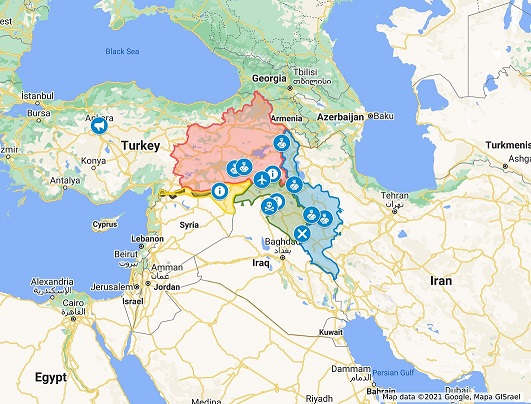1.5K
Iran
- The Kurdistan Democratic Party of Iran (KDP-I) said the Iranian Consulate in Iraqi Kurdistan pressured Kurdish officials into reopening the Parvez Khan border crossing near Kalar city. The Kurdistan Regional Government (KRG) previously closed the border crossing, which remains vital to Iran’s economy, for over a week after striking truckers blocked the passage to protest transit fees.
- The Iranian regime continued its campaign of repression in Iranian Kurdistan (Rojhelat) by arresting seven people last week, including Mohammed Khalidi and his 16-year-old son, Ahmed Khalidi, near Chaldiran, an environmental activist in Marivan named Nawid Konaposhi, Sardar Karamat and Aziz Qadirtaj in Oshnavieh (Shinno), Shoaib Mahmudi in Sanandaj (Sena), and Hemin Arzan in Piranshahr. The Hengaw Organization for Human Rights reported Iranian authorities arrested a total of 31 Kurds for political activism in October.
Iraq
- ISIS (Da’esh) terrorists killed two personnel from the Peshmerga’s 2nd Brigade, 10th Infantry Division near Erbil Governorate’s Makhmour District on Saturday night. The Ministry of Peshmerga Affairs released a statement following the attack that read, “We have warned several times about the resurgence of ISIS sleeper cells, their despicable and cowardly acts will not reach any goal and will nullify the myth of their uprising by the Peshmerga forces.” Several other Kurdish officials and commanders then blamed the Iraqi government for failing to take serious steps towards implementing improved security cooperation and joint agreements to counter Da’esh’s reemergence in the “Disputed Territories.” With that said, however, a Da’esh assault on Diyala Governorate’s Sharaban town last Tuesday nearly sparked a vicious cycle of sectarian reprisals.
- Kurdish lawmaker Zana Khalid told Rudaw that the Kurdistan Parliament would convene to discuss the drafting of a new constitution on November 3. Iraqi Kurdistan currently utilizes a draft constitution passed in 2009, but political disputes have hindered further progress on the 2009 document. The November 3 talks would attempt to forge an agreement between Iraqi Kurdistan’s political parties on a new constitution for the region and set up a referendum to approve it.
- Turkey claimed one Turkish soldier and four Kurdistan Workers’ Party (PKK) members were killed during Turkish military operations in Iraqi Kurdistan last week. Concurrently, the Grand National Assembly of Turkey approved a motion that extended the Turkish government’s authority to conduct cross-border operations in Iraq and Syria for two years, though Turkey’s main opposition party, the Republican People’s Party (CHP), joined the pro-Kurdish People’s Democratic Party (HDP) in voting against the motion. Meanwhile, 52 Kurdish parties and organizations in Europe demanded the Organization for the Prohibition of Chemical Weapons (OPCW) investigate the PKK’s claims that Turkish forces employed chemical weapons.
Syria
- Turkey deployed hundreds of troops to northern Syria in preparation for a new invasion of Syria’s Kurdish region after Turkish President Recep Tayyip Erdogan met with US President Joe Biden in Rome on Sunday. Before the meeting, an unnamed US official said President Biden would warn Erdogan against ‘precipitous’ actions. The White House then released a statement after the meeting that read, “President Biden reaffirmed our defense partnership and Turkey’s importance as a NATO ally, but noted US concerns over Turkey’s possession of the Russian S-400 missile system. He also emphasized the importance of strong democratic institutions, respect for human rights, and the rule of law for peace and prosperity.” Kurdish officials fear a new Turkish attack would target Manbij, Kobani, and Tal Rifaat. Turkey and its proxies also continued shelling Tal Rifaat, Ain Essa, and Zarkan. Concurrently, the Syrian Democratic Forces (SDF) released a report claiming Turkey attacked Ain Essa 13 times in October and footage of an alleged Turkish spy confessing involvement in attacks on the SDF in Deir Ez Zor.
Turkey
- A Kurdish shop owner named Cemil Taşkesen was briefly detained for using the word Kurdistan during Turkish IYI Party leader Meral Aksener’s visit to the Kurdish city of Siirt. Before his arrest, Taşkesen argued with Akenser about Kurdish rights in Turkey and was quoted as saying, “Our language is denied. Our identity is denied. Kurdistan is denied. The place you are in is Kurdistan.” Taşkesen was freed after numerous pro-Kurdish organizations, including the HDP, launched a social media campaign to support him.
- A Turkish court sentenced two senior Kurdish politicians and former co-chairs of the HDP in Batman, Fatma Ablay and Ömer Kulpu, to one year and eight months in prison. Ablay and Kulpu were accused of maintaining ties with the PKK and charged with “spreading terrorist organization propaganda” and the use of an “illegal banner.”
- Hakkari Province’s governor, İdris Akbiyik, extended a ban on public activities, including rallies and protests, for two weeks. The ban was initially imposed on the predominantly Kurdish province in 2016.
- The HDP denounced the Turkish government’s plan to deport 11 Syrian refugees for posting videos on social media that featured them eating bananas in a statement that read, “Both the government and some opposition parties are complicit in the propaganda, which makes migrants look like the cause of the economic and social crisis. False propaganda against migrants who were employed in conditions of slavery, whose labor was exploited, who did not even have life guarantees, paves the way for new lynching attacks.” The Syrian refugees posted the videos, which the Turkish government labeled as “provocative,” after displaced Syrians in Turkey were portrayed as living in luxury.

